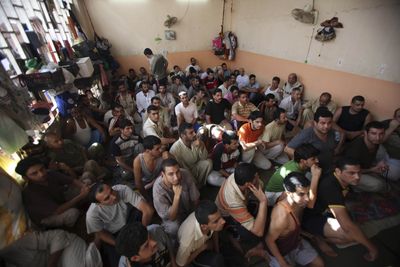Iraq faces claims of inmate abuse
Allegations persist as U.S. transfers prisoners to jail system

BAGHDAD – Iraqi officials outraged by the abuse of prisoners at the U.S.-run Abu Ghraib prison are trying to contain a scandal of their own as allegations continue to surface of mistreatment inside Iraqi jails.
Accounts of Iraqis being beaten with clubs, blindfolded and coerced into signing false confessions are attracting increased attention partly because the United States is getting out of the prison business in Iraq. Since a security agreement took effect Jan. 1, the U.S. has transferred 841 detainees into Iraq’s crowded prison system and more are on the way.
Allegations of mistreatment have persisted since 2005, when U.S. troops raided an Interior Ministry lockup in a predominantly Shiite area of southeastern Baghdad and found scores of emaciated prisoners. The matter returned to the spotlight after the June 12 assassination of Sunni lawmaker Harith al-Obeidi, an outspoken advocate of prisoner rights.
The issue is a test of Prime Minister Nouri al-Maliki’s commitment to the rule of law and to reconcile with the Sunni minority, who account for most of the prisoners held in security cases. Sunnis claim they are being unfairly targeted by security forces run by al-Maliki’s Shiite-dominated government.
“The cases are as bad as what took place at Abu Ghraib, but it is painful when these things take place in Iraqi prisons,” said Sunni lawmaker Salim Abdullah. “We met some of those who were released and saw the scars on their skins. They use different kinds of torture like tying the shoulders and hanging the body, which normally leads to dislocation of the shoulders.”
Iraqi officials acknowledge some abuse and insist improvements are being made. The issue, however, poses a thorny question for Americans: How can the United States transfer detainees into a system where abuse has occurred?
The U.S. military says it sends Iraqi prisoners only to detention facilities approved by Iraq’s Ministry of Justice.
However, Iraqi lawmakers, human rights advocates and the Human Rights Ministry claim most of the abuse is not taking place in prisons run by the Justice Ministry, but in those operated by the Interior and Defense ministries. Prisoners there are generally accused of links to Sunni and Shiite insurgent groups.
Abu Ali al-Rikabi, a father of five who owns a vegetable shop in Diwaniyah, said scars on his legs and back are evidence of his mistreatment at the hands of the Iraqi police who accused him of being involved with a former Shiite militia.
“At dawn one day in November 2007, I was sleeping in my room with my wife when the Iraqi police broke in, handcuffed me and took me blindfolded to their headquarters,” al-Rikabi said. “As soon as they reached the place, they began beating me severely with thick clubs and batons, hitting every part of my body, especially my legs and back. They kept on doing that for three days.”
He said he was ultimately transferred to another prison in Diwaniyah, 80 miles south of Baghdad, and was released the following October. “No one told me why I was arrested or why I was released,” he said.
An eight-member panel that al-Maliki set up after al-Obeidi’s assassination to look into abuse is expected to complete its investigation in a month or two.
A military spokesman, Maj. Gen. Qassim al-Moussawi, said the panel has visited three detention centers in Baghdad and will inspect others. He said most of the abuse uncovered so far took place in Rusafa prison in eastern Baghdad.
At a human rights symposium this month, al-Maliki said allegations would be investigated. The prime minister said detainees should have rights but that no one should ignore the victims of crime – “orphans and the widows who lost their husbands because of terrorism.”
“If every imprisoned person is innocent … then who has destroyed the country? Who killed people?” he asked.